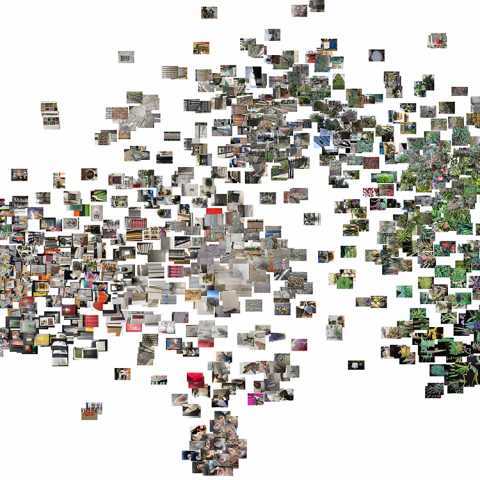Camberwell Space
45-65 Peckham Road
London
SE5 8UF
United Kingdom

An exhibition bringing together work by artist Anna Ridler and work from student participants of a Creative Computing Institute (CCi) workshop on Datasets, the exhibition explores classification systems, artificial intelligence and the hidden humanity behind these invisible infrastructures.
Curated by Georgia Ward Dyer
Private View: 21 April 2020, 6 - 8pm
Exhibition Runs: 24 April – 30 May 2020
Exhibition Open: Monday – Friday, 10am - 6pm and Saturday, 12 – 4pm
This exhibition brings together work by artist Anna Ridler, and work by students from across the University, created in response to a series of Creative Computing Institute (CCi) workshops on datasets, led by Ridler. Taking its title from Bowker and Star’s book on classification systems, the exhibition builds off both Ridler’s own interrogation of datasets throughout her practice, and the growing curiosity and concern of the public in how they are currently shaping artificial intelligence. The works explore the hidden humanity behind these invisible infrastructures from a variety of different perspectives: sometimes experimenting with attempts to reconcile the human and algorithmic gaze, but equally undertaking the important work of exposing the disparity between the two. Wrestling with the imposition of ‘order’ on a subjective world, they serve to uncover how categorisation can be everything from a tool of oppression to a catalyst for creativity.
The UAL Creative Computing Institute supports interdisciplinary teaching, research and knowledge exchange within the domains of computer science and creative practices. Utilising technologies such as machine learning and artificial intelligence the CCi encourages the investigation into how our contemporary world is being defined though human computer interaction and social platforms.
Anna Ridler is an artist and researcher who lives and works in London. She has degrees from the Royal College of Art, Oxford University, University of Arts London and has a fellowship at the Creative Computing Institute at UAL. She has shown at a variety of cultural institutions and galleries including the Centre Pompidou, the Barbican, HeK Basel, Ars Electronica, Sheffield Documentary Festival, Leverhulme Centre for Future Intelligence, Tate Modern and the V&A. She was a European Union EMAP fellow and the winner of the 2018-2019 Dare Art Prize. She has been commissioned by Salford University, the Photographers Gallery, Opera North, Live Cinema UK and Impakt Festival to create works. She was listed by Artnet as one of nine “pioneering artists” exploring AI’s creative potential and received an honorary mention in the 2019 Ars Electronica Golden Nica award for the category AI & Life Art. She is currently nominated for a “Design of the Year” award by the Design Museum for her work on datasets and categorisation. She is interested in working with collections of information or data, particularly self-generated data sets, to create new and unusual narratives in a variety of mediums.
Georgia Ward Dyer is a curator, artist, writer, and researcher working at the intersection of art, philosophy and technology. She is interested in working with artificial intelligence to explore the relationship between language and image, and how taxonomies and archives relate to meaning.
She has degrees from the University of Cambridge, University of the Arts London and the Royal College of Art. In her art practice and curation roles she has worked with institutions including the Victoria and Albert Museum, the Wellcome Collection, and the Barbican, and through her research roles has worked on publications for Arts Council England, Nesta, and the European Parliament.
